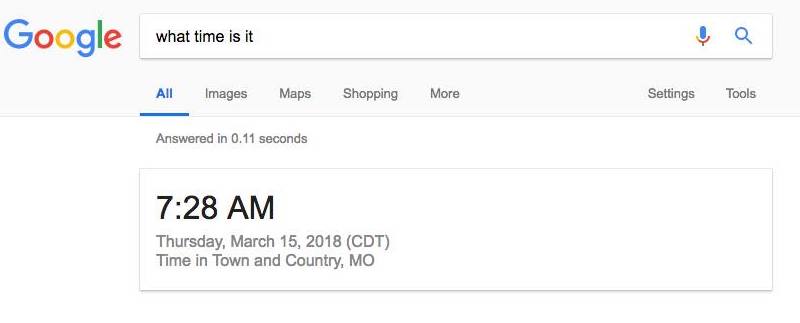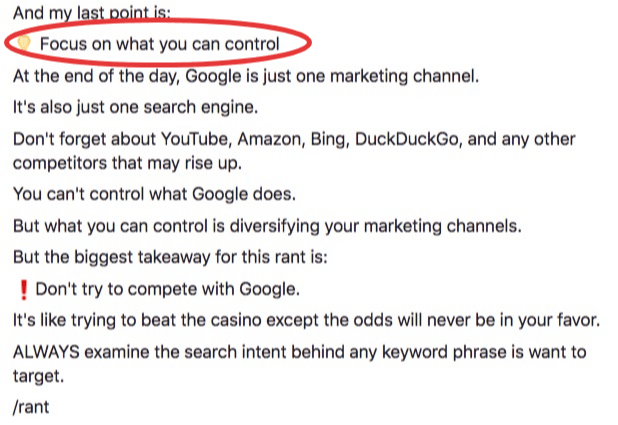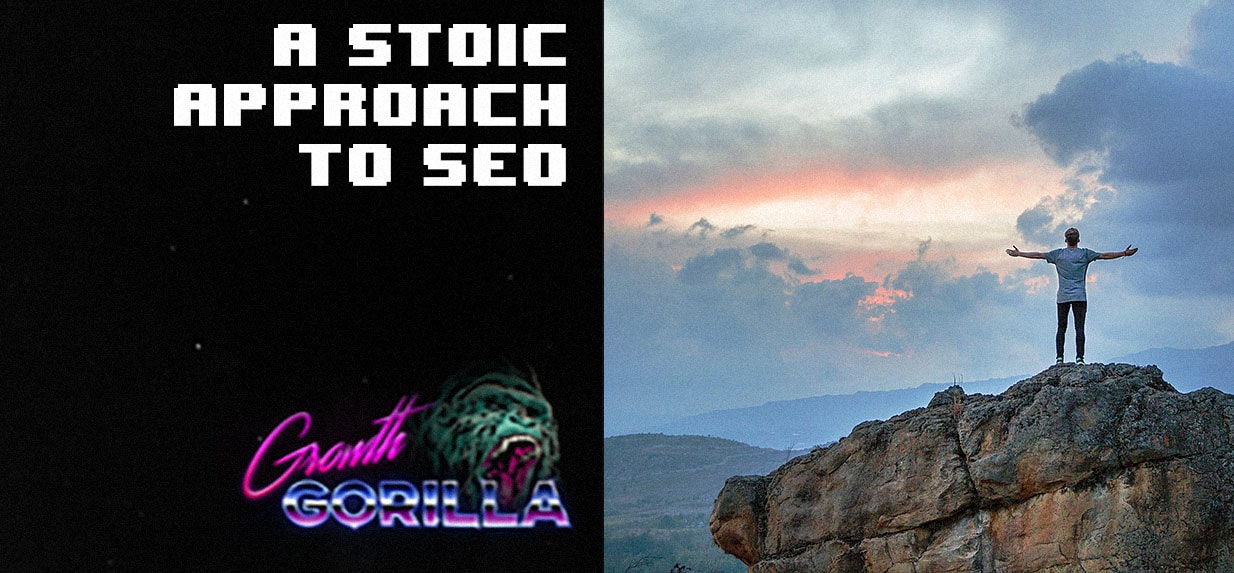phi·los·o·phythe study of the fundamental nature of knowledge, reality, and existence, especially when considered as an academic discipline.
What I love about this definition is the word “reality”.
So here’s the kicker: philosophy works in real life, it’s not just some boring thing you study in school.
Especially for marketers like us, constantly in the trenches, surrounded and inundated by news over news, algorithm changes and blog posts over blog posts showing the latest tips and tricks, weirdly named strategies and the list goes on…
For me there’s one philosophy, in particular, that has proven successful, Stoicism.
In this article, I’m going to show how, you, as an SEO can apply it to your everyday work life. I’ve been doing the same for the past 3 years and let me tell you… it worked wonders.
I’ve been able to enjoy my work and be calm and relaxed even in the midst of everyday problems and emergencies.
And you can too.
Why do people overcomplicate SEO?
Let’s start at the beginning.
For one, SEO is complicated, it’s ever-changing and evolving all the time. Still, I’m convinced more and more people are overcomplicating it.
Might be because of its roots and the various “colored hats”? Might be on purpose to make themselves look more glamorous? Or maybe because SEO is really hard?
SEO is a long-term thing, it needs attention and the results are not very predictable.
According to Rand Fishkin (founder of Moz and now of Spark Toro):
“SEO is difficult in my opinion because the practice combines so many unique aspects of marketing. It’s creative, it’s strategic, its technical, and it’s multidisciplinary, meaning that you have to talk to a lot of different departments in an organization.It is a very complex set of tasks and to top it all off SEO changes dramatically all the time, so the fundamental best practices are often very very similar from year to year but there’s always nuance, new additions, new opportunities, new ways that the search engines are changing up what the results look like, how you can target terms and phrases, how searches are happening what types of results appear” Source
This is the nature of the game and it ain’t gonna get much easier. That said, even if SEO is difficult, it can be made quite simple. IF, you take the right approach.
With the “right approach” I mean focusing on those activities that we can perform and that we know give us the best return on our time and investment.
What is “under our control”.
This is where most people get it wrong.
True, Google is an algorithm. It’s complex and we don’ìt know shit about it. Still, there are a few “80/20” activities that actually work and can help us avoid a lot of headaches.
As Dan Shure of Evolving SEO says in his article about the 80/20 of SEO:
Use 80/20 to do two things really;
What do these activities have in common? They are all things that depend on you. It is 100% up to you to test, see the results and decide what to do more of and what to do less of.
This all reminded me of my favorite philosophy, Stoicism.
What is Stoicism and why is it good for an SEO?
“Stoicism has just a few central teachings. It sets out to remind us of how unpredictable the world can be. How brief our moment of life is. How to be steadfast, and strong, and in control of yourself. And finally, that the source of our dissatisfaction lies in our impulsive dependency on our reflexive senses rather than logic.
Stoicism doesn’t concern itself with complicated theories about the world, but with helping us overcome destructive emotions and act on what can be acted upon. It’s built for action, not endless debate.” dailystoic.com
You see,
SEO in 2018 is all about quality, content, UX and satisfying searcher intent. It’s time to leave behind the outdated tricks and gimmicks.
It’s time to stop constantly worrying about the latest Google update and algorithm change.
Focus on what you can control and forget everything else.
Here’s a recent example of when people found out that Google was presenting people with 1 result only in the SERPs:
 Nathan Gotch from Gotch SEO, published his considerations on the matter on Facebook:
Nathan Gotch from Gotch SEO, published his considerations on the matter on Facebook:

This resonated with me so much and it gave me the idea for this whole article. And I think Nathan was 100% spot on.
In this, I believe Stoicism can be of great help to SEOs. I’ve been practicing it for the past 3 years and it has become an invaluable asset in my SEO toolkit. Much like Ahrefs, Screaming Frog, Scrapebox, and company… but for the mind, which is probably the most important.
Because you see,
We often forget that we are SEOs and marketers, but we are also (and most of all) human beings. We have emotions, emotions cloud our judgment and make us ineffective.
As outlined in the book “The Obstacle is the Way” by Ryan Holiday (which was my introduction to Stoicism), In order to “live a good life” and overcome all sorts of obstacles, one must practice 3 main disciplines:
- Perception
- Action
- Will
As an SEO, you can use these in your work as well as in your life.
Let’s look at each of them in more detail and how you can apply it to your work as an SEO and marketer.
1. What is Perception?
See things how they really are. Neither good nor bad. Separate reliable signals from deceptive ones.
- Is it under your control? Act on it.
- Is it not? Leave it, it’s not up to you.
“It’s not what happens to you, but how you react to it that matters.” Epictetus
How do you apply Perception in SEO?
Do what you can control means focusing on those activities that don’t depend on anyone else but yourself to be executed.
Leave everything else out of it and take action on these few (but important) things before you move on to what’s next:
(p.s. I won’t get into much detail on these because it’s not the purpose of this article)
a. Help search engines read your content.
Some of the most common activities include:
- Sitemap
- Robots.txt
- Duplicate content
b. Help search engines understand your content
Some of the most common activities include:
- Titles
- Headers
- URL
- Images
- descriptions
c. Focus on searcher intent:
Answer questions, solve problems, show options, give value, get links.
2. What is Action?
Get moving, greet and act on your obstacles with “persistence, a deliberate process, strategic vision, iteration and resilience, craftiness and savvy, an eye for opportunities and pivotal moments.”
Now, there’s a difference between action and “right” action. Right action is deliberate and strategic. It is important to take action and don’t stay still but at the same time, you must have a plan.
What if the plan doesn’t work?
In SEO the plan almost never works the first time. This I why it is important to try and change approach, always focus on the basics but try and see things from a different perspective.
Ryan Holiday mentions the “flank attack”, don’t attack where the enemy is expecting, find a better way, an unexpected way to catch the enemy or the obstacle by surprise.
What is “right” action in SEO?
Look at the competition and see what they are doing. Can you get some quick win ideas from their strategy? Can you steal their angle and make it unique to your situation? Be careful to always test assumptions thought. What works for others might not work for you.
Follow industry news but focus on what matters, avoid shiny objects. I do read many SEO blogs. I also am very careful with avoiding shiny object syndrome. For example, if I see someone blogging about a new strategy or technique, I don’t drop everything I’m doing to try that out.
Look at what’s in front of you, finish what you started and keep following your process until it works (or until it doesn’t). Take consistent action, experiment but keep an eye on the basics at all times.
Specialize, test, validate and iterate.
One thing you can always do is to specialize, find that one thing you’re uniquely qualified at that makes you special and do it at scale. Could be link building or keyword research, if you’re amazing at it, take advantage of this and you will get noticed.
You’ll get results and this will start a positive feedback loop that will make you even more successful.
These are all simple and “easy” things that are under your total control and will help you do good work without the anxiety.
A simple plan of action in SEO might look like this: https://blog.hubspot.com/marketing/seo-strategy
3. What is Will
“Our internal power that cannot be affected by the outside world. It’s fortitude and wisdom. It gives us the strength to endure, contextualize, and derive meaning from the obstacles we simply cannot overcome.” The Obstacle is the Way, Ryan Holiday
In short, will is what allows us to keep working and to keep doing good work.
Many people doing SEO get tired after the first few tries working on their site by “Google’s laws” and the make the shift towards tricks, tips, and short-term strategies that might give them quick results. These results are often unsustainable, their site gets penalized and that’s it. SEO is dead. It doesn’t work. It’s just spam.
On the other hand, there are also many great SEOs who, even after the initial struggles, shifted towards more sustainable, long-term strategies, the so-called “white hat SEOs”.
These people aren’t special, they just have within themselves the strength and the will to keep looking at the bright side.
“Something didn’t work? Oh well, I just learned something new!” Moving on.
What’s will for an SEO?
In (almost) every situation we can:
- learn from our mistakes and prepare for more difficult times
- accept something might not work and try something else
- think about the worst case scenario and try to anticipate it
- look at the long-term, bigger picture instead of focusing on the short-term gains.
Conclusion
This wasn’t meant to be a comprehensive guide on how to do SEO, neither as a philosophical debate. See it as a friendly advice from me. I keep seeing many of my friends getting stressed out by their work (even if they love it) that it just made sense for me to write this. I admit it’s kind of a rant.
Hopefully, you’re already doing all this, if not, go read “The Obstacle is the way” now, you won’t regret it, I promise!

This is awesome, Alan! Many SEOs and marketers (including myself) forget that mastering your mindset is the key to success in any endeavor. I think this is because thinking and reasoning are really hard. One book that’s helped me a lot with this is Seeking Wisdom. It’s the type of book that requires 100% concentration because the concepts are deep, but it can be pretty life-changing.
Thanks for the article!
– Gotch
Thanks, Nathan! Will check the book out 🙂
Also, many of the stoic concepts I talk about here are also mentioned (in one form or another) in the book “Wooden”, which you recommended me. So, Thanks for that as well!